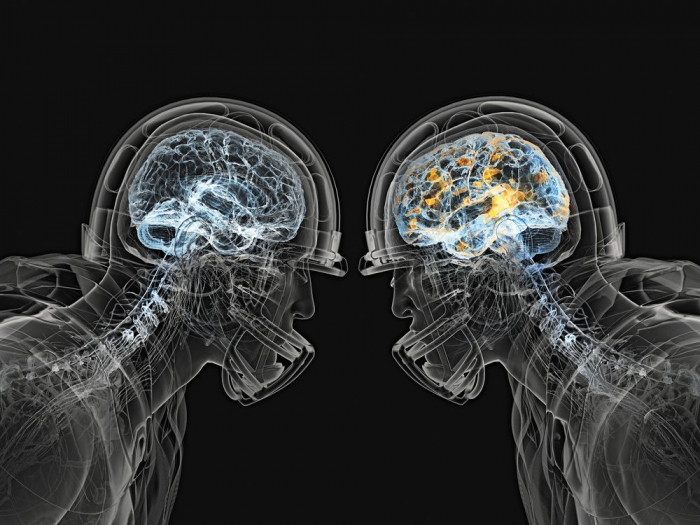"Among people who have CTE, people with this [genetic] variation are 2.5 times more likely to develop dementia," said Dr. Jesse Mez, assistant professor of neurology at Boston University's School of Medicine. Mez was a co-author of the study, published Saturday in the journal Acta Neuropathologica Communications.
Mez said the findings, though early, are a step toward better understanding of the disease. "It helps us better understand biologically, mechanistically, what is going on in the brain in CTE.
"In understanding the mechanism and in identifying this genetic risk factor, we have new potential targets to develop therapies," he said.
The authors point out that their findings need to be further investigated in a larger group and replicated to make any definitive conclusions.
Proceed with caution
Dr. Sam Gandy, a professor of neurology and psychiatry and director of the Center for Cognitive Health at Mount Sinai in New York, said the findings were simply too premature and couldn't account for other genes that may be involved in the disease, like APOE4.
Gandy, who was not involved in the study, wrote in an email that the findings were "not ready for prime time."
Dr. Bennet Omalu, the pathologist who first detected CTE in professional football players, agreed that it was too early to make much of the findings.
"We need to tread carefully. The study shows that the gene may be associated with reduced risk for CTE, but CTE is a polymorphous and polyphenotypic and polygenetic disease, [and] focusing on one gene, which may reduce risk, may be a stretch," Omalu, who was also not involved in the new research, wrote in an email.
Mez and his team at Boston University are also looking at other genes that may play a role in CTE. "If these other genes do have an effect, it will likely be independent and additive with the TMEM finding."
Mez added that it is "likely several genes across the genome that contribute to CTE risk and severity, and in the future, considering all of them together will improve our predictive capability. "
Today, CTE can be diagnosed only after death. It's believed to result from repeated head trauma. In football, this can happen not just from hard hits to the head that result in concussion but from the repeated rattling of the brain inside the skull during tackles and falls to the turf. These repeated hits are known as subconcussive hits and can result in a buildup of a kind of protein called tau in the brain.
Early and longer exposure to repeated trauma is also considered to be a likely contributor to the disease. There is no treatment or cure for the disease.
Gene variant tied to less-severe CTE
Mez and his colleagues evaluated the brains of 86 former football players who had CTE and no traces of other neurodegenerative diseases and compared them to the brains of 376 patients who did not have CTE. All the brains were part of the VA-BU-CLF Brain Bank, a collaboration among the VA Boston Healthcare System, Boston University and the Concussion Legacy Foundation.
The researchers found no association between the gene variant itself and CTE. But those who had CTE and the gene variant had lower amounts of tau and reduced inflammation in the brain than those who had CTE but no variant.
Both inflammation and a buildup of tau in the brain contribute to the brain's degeneration.
"Among just those with CTE, that CTE-related outcomes were more severe, they were more likely to have dementia, and they were more likely to have advance neurodegeneration in their brain," Mez said.
In a study last year, Boston University researchers detailed finding CTE in the brains of 100 of 101 former NFL players. And although the presence of the disease is extremely high in the study, it is hard to extrapolate to overall prevalence among football players as well as the general public because the brains studied carried a potential bias: They were donated from relatives because the subjects had probably exhibited symptoms of the disease such as memory loss, confusion, depression and impulse control problems.
Last week, the Concussion Legacy Foundation announced that 147 colleges have had former football players diagnosed with CTE.
Understanding the difference
Dr. Geoff Manley, professor of neurosurgery at University of California, San Francisco, says the new research is a step in the right direction.
"This research, while early, suggests there may be some genetic risk factors. However, there was no difference between those with and without CTE. The TMEM106B gene has also been associated with frontotemporal dementia, suggesting potential overlap with a number of neurodegenerative diseases," Manley, who was not involved in the study, wrote in an email. "More research is needed with large numbers of individuals with and without long-term issues to fully understand their cause and effect."
Mez noted, "We see a lot of former athletes who have similar levels of exposure. Two football players in college, who played eight to 10 years. Late in life, one of them develops severe disease, and the other might be mildly impaired.
"I think it's of value to understand that difference, and this finding starts to explain these types of differences," he said.
CNN
More about: CTE
















































